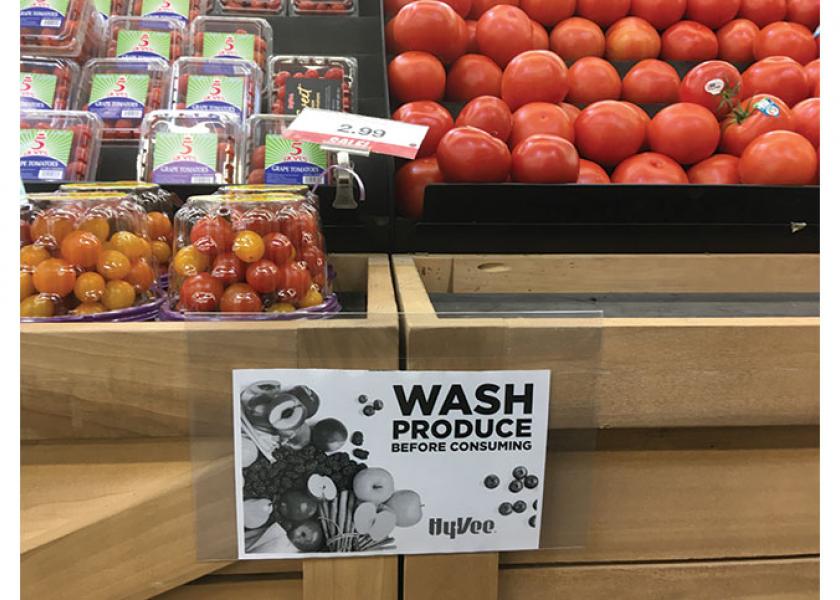COVID-19 response involves produce food safety experts

Stay up to date on the latest COVID-19 updates here.
Though the new coronavirus COVID-19 is not a food safety issue, responding to the crisis has pulled in produce safety professionals in a variety of ways.
Much of the work has involved pulling together resources and guidance documents on best practices to prevent the spread of the virus in produce operations.
“It has dominated what I have been doing for four months,” said Trevor Suslow, vice president of food safety for the Produce Marketing Association.
While COVID-19 is not a food safety issue, many produce food safety professionals have been engaged with the issues and helping their companies respond, said Bonnie Fernandez-Fenaroli, executive director of the Center for Produce Safety.
“These are the people you want to be in the trenches with,” she said. “This is a pretty smart group; when it comes to a crisis, these are the (people) you want to work with,” she said.
Consumers have been concerned about transmission of the virus through fresh food, even though researchers said there is no evidence that occurring.
United Fresh and PMA have worked closely with the Partnership for Food Safety Education to dispel myths on COVID-19 and food, said Jennifer McEntire, vice president of food safety and technology for the United Fresh Produce Association.
“Early on, we’ve tried to put those messages out there,” she said.
A Centers for Disease Control and Prevention consumer survey, titled “Knowledge and Practices Regarding Safe Household Cleaning and Disinfection for COVID-19 Prevention — United States, May 2020,” found that there are identified gaps in knowledge about safe preparation, use and storage of cleaners and disinfectants.
About one third of survey respondents engaged in non-recommended high-risk practices with the intent of preventing SARS-CoV-2 transmission, including using bleach on food products, applying household cleaning and disinfectant products to skin, and inhaling or ingesting cleaners and disinfectants, the CDC said in the report.
“Thirty-nine percent reported intentionally engaging in at least one high-risk practice not recommended by CDC for prevention of SARS-CoV-2 transmission (2), including application of bleach to food items (e.g., fruits and vegetables) (19%); use of household cleaning and disinfectant products on hands or skin (18%); misting the body with a cleaning or disinfectant spray (10%); inhalation of vapors from household cleaners or disinfectants (6%); and drinking or gargling diluted bleach solutions, soapy water, and other cleaning and disinfectant solutions (4% each0,” the report said.
Health officials have said consumers should use plain water to wash fruits and vegetables.
Suslow said it can be challenging to combat wrong perceptions spread by social media, but the work goes on to combat anti-science behavior with appropriate experts explaining the true nature of the issue and giving consumers the assurance that the industry is doing its part.
PMA also is conducting consumer-facing research on attitudes toward fresh produce during the pandemic, he said.
In research conducted in late May, PMA consumer research found that 58% agreed with the statement “I am concerned about the safety/cleanliness of fresh produce now.” That was down about 3% compared with the start of the surveys in late March.
For the 14% buying less produce now (nearly 50% say they are buying more), PMA reported that the reasons given for buying less are:
- I am shopping less frequently so I am concerned about how long it will last (49% in late May, down 2% from late March);
- I am concerned about its safety/cleanliness (35% in late May, down 6% from late March);
- It is hard to find what I want in the stores where I shop (24% in late May, down 8% from late March);
- It costs too much/am having financial issues (21% in late May, up 1% from late March);
- I am not satisfied with the quality that is available where I shop (13% in late May, down 2% from late March);
- I am concerned about its country of origin/where it was grown (14% in late May, no change from late March);
- I am not that concerned about eating healthy right now (12% in late May, up 2% from late March);
- I consider eating fresh produce a treat right now (13% in late May, up 4% from late March); and
- I am shopping more online now and don’t trust the quality of online produce (19% in late May, up 10% from late March).
Related content:
Clear Labs receives food safety innovation award
LGMA charts course to achieve food safety goals
Indoor growers discuss food safety concerns







